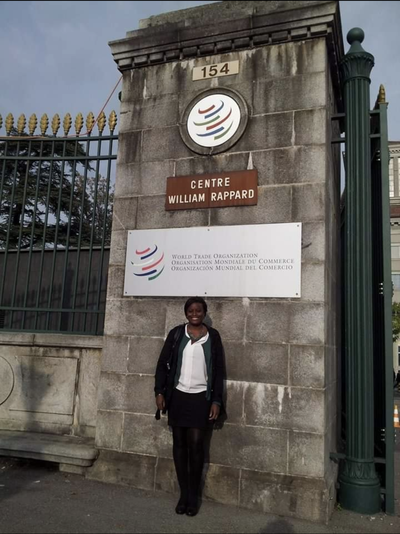14 Oct 2022
MILE Alumni Profile: Titilayo Obiri
Companies who hire WTI students gain employees who are resilient, analytical in their reasoning, curious about the world around them, and who are comfortable in an international work environment with diverse perspectives.
Today we meet Titilayo Obiri, MILE Alumna and currently Trade Compliance Specialist - Europe, BDP International
Hello Titilayo! You attended the MILE 14 programme. What did you do after graduating from the WTI?
I first went back home to the U.S. to do an internship at the Office of the United States Trade Representative in Washington, D.C. Eventually I moved to Brussels where I worked in EU public affairs, supporting companies in the branded clothing sector on EU trade policy matters. I currently work as a trade compliance specialist for a global logistics company.
How was your WTI experience and how did it contribute to your career?
At the Office of the USTR, I interned for the communications office and had my first experience in media and public affairs in trade policy. It was an exciting time, during the Obama Administration's TTIP and TPP negotiations. After the MILE program, I knew that I wanted to work in international trade policy and this was an excellent first step on that path. I quickly learned the value in effectively communicating trade policy jargon to the wider public and how important it is in shaping a convincing political argument in trade negotiations, both domestically and when facing trade partners.
In Brussels, I was able to apply the theory I learned from my studies at the WTI to EU trade policy. I found it quite eye-opening to navigate the Brexit trade negotiations after having studied so many of these aspects during the MILE program.
In both experiences, I learned how important effective communication is in convincing the public when it comes to the complexities of international trade. This same principle applies in the private sector when working with different internal stakeholders.
How is the position you currently hold relevant to what you studied at the WTI?
I currently work as a trade compliance specialist for a logistics company, advising clients on European import and export matters. I made the shift from international trade policy to trade compliance 4 years ago when I decided I wanted to work in a role that is more hands-on when it comes to international trade.
I became curious about how the theories that I had studied at the WTI were applied to trade policy making in Washington and Brussels and subsequently, how companies are faced with implementing these policies and regulations in a more practical sense. Are trade regulations actually serving the purpose that policy makers set out to achieve during negotiations? What domestic challenges do companies face when applying trade laws? How does these challenges affect how a company operates and in turn, how does this affect the economy? These were questions that we dissected during our classes at the WTI that seemed too theoretical to me at the time. In my current role, I get to find out the answers to these questions on a daily basis when working with clients.
Why should private companies hire WTI students?
WTI students are well trained and knowledgeable. Having gone through the intensive MILE program, I felt like I went through international trade boot camp! The MILE taught me to think critically and under pressure and to understand the political context behind international trade policy making. Companies who hire WTI students gain employees who are resilient, analytical in their reasoning, curious about the world around them, and who are comfortable in an international work environment with diverse perspectives.
And why should WTI students look for opportunities in the private sector (on top of NGOs, law firms and international organisations)?
WTI students can gain real-world experience in international trade by seeing how trade works in action. Working in the private sector is one way to witness how the theories behind trade are applied in real time. Private sector careers also open up a world of opportunities for career growth. For instance, you could work in various roles within the same company and gain a wide range of knowledge and experience in a sector.
How does knowledge in trade law benefit private companies?
Trade compliance and international trade in general is a niche area in the private sector these days. With global challenges like the COVID-19 pandemic, war in Ukraine, Brexit, etc, companies are starting to realize how relevant experts in international trade are for their company and bottom line. Whether it's navigating and complying with export/import sanctions, making sure materials are shipped with the correct preferential status documents, or ensuring all necessary export licenses are in place, knowledge in trade law is a niche and crucial skillset for global companies to have on board. I would encourage WTI students to explore the trade compliance job market in private companies (or even in consulting firms) as there is an increasing need.
Further info
Titilayo Obiri on LinkedIn
More about WTI Alumni
Alumni Stories Series
More on the MILE Program





